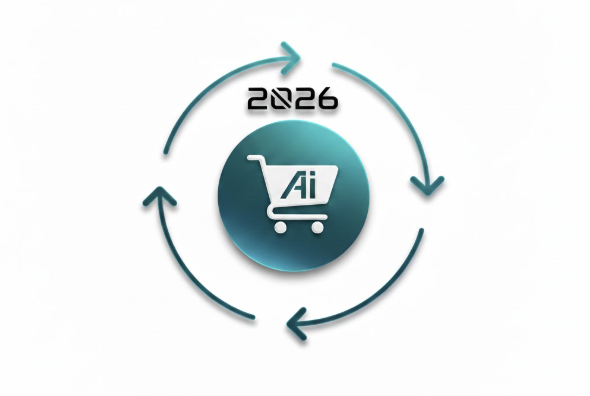AI for Ecommerce SEO: Generating PDP Copy, Meta Tags, and Internal Linking That Drive Organic Revenue

Key Takeaways
- AI-powered SEO automation delivers 45% more organic revenue by transforming product description creation, meta tag optimization, and internal linking from manual bottlenecks into scalable, brand-safe processes
- Enterprise ecommerce sites with 10,000+ SKUs require AI to compete - manual content creation simply cannot scale while maintaining consistency, brand voice, and compliance across massive product catalogs
- PDP copy generation becomes 12x faster and 65% more cost-effective when AI systems understand product attributes, customer language, and brand guidelines rather than relying on generic templates
- Meta tag optimization through AI drives 6-12% higher click-through rates by dynamically crafting titles and descriptions that adapt to search trends while automatically maintaining character limits and schema markup
- Intelligent internal linking systems create millions of contextual connections that improve both user experience and search crawlability, with documented cases showing 27% user activity growth in just 6 weeks
- Brand-safe AI implementation requires built-in guardrails to ensure regulatory compliance, maintain brand voice, and prevent the hallucinations that plague generic AI tools
- Envive's commerce-focused approach delivers 3-4x conversion lift by combining behavioral intelligence with product feed enrichment, creating AI that actually drives sales rather than just organizing content
Traditional ecommerce SEO approaches crumble under the weight of modern catalog complexity. While businesses manually struggle to optimize thousands of product pages, 67% of companies now use AI for SEO and content marketing, with 78% reporting satisfaction with results. The transformation isn't gradual—it's revolutionary.
Google's March 2024 algorithm update eliminated 45% of low-quality content, while traditional search volume faces a projected 25% decline by 2026. For ecommerce businesses managing extensive product catalogs, this creates an existential challenge: embrace AI-powered SEO automation or risk obsolescence in an increasingly competitive digital landscape.
The market validates this shift decisively. The AI SEO software market, valued at $1.99 billion, will reach $4.97 billion by 2033, representing a transformation that McKinsey estimates could increase marketing productivity by 5-15%, worth $463 billion annually across industries.
The Scale Crisis: Why Manual SEO Fails at Enterprise Level
Modern ecommerce faces an impossible scaling challenge. Enterprise retailers typically manage 10,000 to 100,000+ SKUs across multiple channels, each requiring unique product descriptions, optimized meta tags, strategic internal linking, and continuous updates for pricing, inventory, and seasonal changes. Manual catalog management becomes impossible to scale effectively while maintaining consistency and quality.
The human bottleneck manifests in several critical ways:
Content Creation Paralysis: Creating unique product descriptions for extensive catalogs demands significant personnel investment, with quality and consistency degrading as teams scale. Professional copywriters charge $10-50 per description, making comprehensive catalog optimization prohibitively expensive for most businesses.
Meta Tag Inconsistency: Manual meta tag creation across thousands of products results in character limit violations, keyword stuffing, and inconsistent messaging that hurts click-through rates and search rankings.
Internal Linking Chaos: Maintaining strategic internal linking across large catalogs becomes virtually impossible without automated systems that understand topical relationships and user behavior patterns.
Technical Complexity: Large sites face exponentially growing challenges with crawl budget limitations, widespread duplicate content issues, and maintaining Core Web Vitals across thousands of pages.
Target Australia demonstrates the alternative: generating over 1,000 product descriptions weekly using AI with 98% accuracy on first generation—a feat impossible through manual processes.
AI-Powered PDP Copy Generation: From Templates to Intelligence
Modern AI systems transform product description creation from template-filling exercises into intelligent content generation that understands context, brand voice, and customer intent. AI-generated product descriptions cost approximately $1 per 100 descriptions, compared to $10-50 for professional copywriters, while delivering superior consistency and brand alignment.
Beyond Basic Automation
Sophisticated AI platforms like those used by Target, UGG, and Cotton On employ advanced natural language processing that analyzes product images alongside text data, understands category-specific terminology, and maintains consistent brand voice across unlimited SKUs. These systems don't simply fill templates—they understand product attributes, customer language patterns, and competitive positioning.
The technology stack typically includes GPT-4 or similar large language models fine-tuned on brand-specific content. Rocky Brands achieved 30% increase in search revenue and 74% year-over-year growth using AI-powered keyword targeting and content optimization that goes far beyond basic description generation.
Content That Converts
Effective AI-generated content transforms specifications into customer benefits while naturally integrating relevant keywords. Instead of "100% cotton blend fabric with moisture-wicking properties," AI systems generate "Stays comfortable during your morning workout and looks great for coffee afterward"—content that addresses customer needs rather than just listing features.
This approach delivers measurable results. Well-implemented AI content strategies show 12x faster content creation with 65-75% time savings on research and optimization tasks, enabling teams to focus on strategy rather than repetitive content creation.
However, brand safety remains paramount. Generic AI tools often generate off-brand content or make product claims that violate compliance requirements. Commerce-focused platforms like Envive address these challenges through built-in guardrails that ensure all generated content maintains brand voice and regulatory compliance.
Meta Tag Optimization: Dynamic Intelligence for Higher CTRs
Meta tag optimization represents one of AI's most immediate impact areas for ecommerce SEO. Well-optimized AI-generated meta descriptions improve click-through rates by 6-12%, while automated systems ensure proper character limits and keyword integration across massive product catalogs.
Real-Time Adaptation
Dynamic AI systems craft title tags and meta descriptions that adapt to search trends in real-time, moving beyond static templates to generate contextually relevant content. These platforms automatically adhere to Google's character limits (60 characters for titles, 160 for descriptions) while maximizing click-through potential through compelling, action-oriented language.
Advanced implementations automatically generate proper schema markup for products, reviews, pricing, and availability. This structured data optimization significantly increases chances of rich snippet appearances in search results, providing competitive advantages in crowded ecommerce categories.
Platform-Specific Optimization
Different ecommerce platforms require tailored approaches. Shopify's built-in Shopify Magic offers native AI capabilities included with all plans, while third-party apps provide advanced features. BigCommerce's BigAI Suite includes built-in copywriting and feed management, offering superior URL structure control compared to competitors.
Magento users benefit from extensions like Mageworx SEO Suite Ultimate with ChatGPT integration, while WooCommerce leverages deep WordPress ecosystem compatibility through plugins like AI for SEO.
Internal Linking Intelligence: Connecting Products Through AI
Internal linking often gets neglected due to its complexity at scale, yet it represents one of the most powerful SEO opportunities for ecommerce sites. AI-powered internal linking systems can achieve remarkable results by automatically identifying and implementing optimal linking opportunities.
Semantic Understanding
Modern AI systems use vector-based content mapping and semantic analysis to understand topical relationships between products, categories, and content pages. Rather than simple keyword matching, these tools comprehend conceptual connections—linking complementary products, related categories, and supporting content in ways that enhance both user experience and search engine crawlability.
Scale and Automation
Manual internal linking becomes impossible when managing thousands of product pages. AI systems automatically place contextually relevant links that improve site architecture while distributing page authority strategically throughout the catalog. These connections evolve dynamically as inventory changes, new products launch, and user behavior patterns shift.
The impact extends beyond SEO metrics. Intelligent internal linking increases average session duration, reduces bounce rates, and guides customers toward purchase decisions through strategic product recommendations and cross-selling opportunities.
ROI Reality: Measuring AI SEO Impact
SEO delivers an average $5.50 return for every $1 spent, ranging from $2.75 to $12.30 depending on implementation quality. For AI-enhanced campaigns, these returns amplify significantly through improved efficiency and effectiveness across all optimization activities.
Implementation Timeline and Results
Implementation timelines prove surprisingly quick for motivated teams. Lyzr AI achieved 150% organic traffic increase in just 3 months using AI-powered content optimization, while documented cases show 535%+ traffic increases within 7-12 months for well-executed implementations.
The typical progression follows a predictable pattern:
- 3-6 months: Initial traction with improved content quality and search rankings
- 4-6 months: Gradual growth as AI systems learn and optimize
- 7-12 months: Exponential results as algorithmic improvements compound
Bankrate.com generates 125,000 monthly organic visits from 160+ AI-generated articles published over six months, with every piece reviewed by subject matter experts to ensure accuracy and brand compliance.
Conversion Impact
40% of marketers report 6-10% revenue increases after AI SEO implementation, with 68% achieving higher ROI from content marketing overall. These improvements stem from multiple factors: better keyword targeting, improved content relevance, enhanced user experience through smart internal linking, and consistent brand messaging across all touchpoints.
STACK Media's collaboration with AI-powered SEO tools yielded 61% increase in website visits and 73% reduction in bounce rates through systematic competitive research and AI-optimized page templates.
Compliance and Brand Safety: Navigating the Regulatory Landscape
The regulatory landscape for AI-generated content shifted dramatically in 2024. The FTC's new Trade Regulation Rule requires clear disclosure when content is AI-generated, with penalties reaching $51,744 per violation. This extends beyond simple content creation to reviews, testimonials, and any material connections between AI systems and brands.
Industry-Specific Requirements
Different industries face varying compliance challenges. Healthcare AI tools fall under FDA's Software as Medical Device regulations, requiring rigorous testing and validation. Financial institutions must test AI systems for discriminatory outcomes while managing rapidly evolving regulatory requirements.
Quality Control Systems
93% of businesses review AI content before publishing, implementing tiered review processes that combine automated brand compliance checks with human editorial oversight. Successful examples include Bankrate's approach of having subject matter experts review every AI-generated article, ensuring both accuracy and regulatory compliance.
Leading platforms address compliance concerns through comprehensive AI governance frameworks, regular bias testing, and detailed documentation of training data sources and model decisions.
The Envive Advantage: Commerce-Native AI That Actually Converts
While the market offers numerous AI SEO solutions, most fail to address ecommerce-specific challenges effectively. SEO.ai stands alone as the only truly e-commerce-specific platform, but even specialized tools often lack the behavioral intelligence necessary to drive actual conversions rather than just organizing content.
Beyond Generic AI Tools
Generic platforms like Jasper ($49-$69/month) and Copy.ai ($36-$249/month) excel at content generation but lack ecommerce-specific features like product attribute understanding, inventory integration, and customer journey optimization. SEO specialists like Clearscope ($189-$1,200/month) provide excellent content optimization but ignore product-specific needs and conversion optimization.
Envive's approach differs fundamentally. Rather than building another content generation tool, Envive creates AI agents that understand the connection between product data and customer behavior. This creates enrichment that actually drives conversions rather than simply organizing information.
Behavioral Intelligence Integration
Envive's AI agents learn from every customer interaction—what customers search for, how they browse, and what leads to purchases. This insight informs how products are categorized, described, and presented across all channels. The platform's Search, Sales, and Support agents share insights about product performance, customer questions, and content effectiveness, creating a feedback loop that continuously improves SEO performance.
Proven Performance
Envive delivers measurable results that matter to ecommerce businesses:
- 3-4x conversion rate lift through better product discoverability and more compelling content
- 6% increase in revenue per visitor by helping customers find relevant products faster
- 18% conversion rate when AI is engaged, demonstrating the power of intelligent product presentation
Implementation Advantages
Envive's commerce-focused platform provides several key advantages for SEO implementation:
Rapid Deployment: Pre-built integrations with major ecommerce platforms enable quick implementation without heavy technical lift, getting businesses optimized in weeks rather than months.
Continuous Learning: The system gets smarter over time, using real customer data to improve PDP copy effectiveness, meta tag performance, and internal linking strategies.
Unified Analytics: Track SEO impact across search performance, conversion rates, and customer satisfaction in a single dashboard, enabling data-driven optimization decisions.
Merchant Control: Brands retain full control over optimization parameters, ensuring AI enhancements align with business strategy and brand guidelines.
Future-Proofing Ecommerce in the AI Search Revolution
The search landscape faces unprecedented disruption. Traditional search volume will decline 25% by 2026 as AI chatbots and virtual agents reshape discovery. AI search visitors already prove 4.4x more valuable than traditional organic search visitors, requiring new optimization strategies.
Search Everywhere Optimization
Adapting requires embracing "Search Everywhere Optimization"—optimizing not just for Google but for ChatGPT, Perplexity, social commerce platforms, and emerging AI search tools. 21% of US web users visited ChatGPT monthly in Q4 2024, generating significant traffic that traditional SEO approaches cannot capture.
AI search optimization represents a new category where ChatGPT search cites pages ranking in positions 21+ almost 90% of the time. This creates opportunities for well-optimized ecommerce sites to gain visibility even without traditional top rankings.
Multi-Modal Content Strategy
Success in the AI search landscape demands three critical adaptations:
- Structured Data Becomes Non-Negotiable: AI platforms rely heavily on schema markup to understand and surface product information across different search interfaces.
- Conversational Optimization: Natural language queries dominate AI search, requiring content that answers customer questions rather than targeting specific keywords.
- Multi-Modal Integration: AI search tools develop sophisticated understanding across text, images, and video, making comprehensive content optimization essential.
Platforms like Envive position businesses for this transition by creating SEO strategies that work across traditional search engines and emerging AI-powered discovery platforms.
Frequently Asked Questions
How quickly can AI-powered SEO deliver measurable results for ecommerce businesses?
Most businesses see initial improvements within 3-6 months of implementation, with significant traffic and revenue increases typically appearing within 4-6 months. Documented cases show 150% organic traffic increases in just 3 months for well-executed AI SEO campaigns, while comprehensive implementations can achieve 535%+ traffic growth within 7-12 months. The key is starting with high-impact areas like product descriptions and meta tags before expanding to more complex optimizations.
What's the actual cost difference between AI-generated and manual content creation for large ecommerce catalogs?
AI-generated product descriptions cost approximately $1 per 100 descriptions, compared to $10-50 per description for professional copywriters. For a catalog of 10,000 products, manual copywriting could cost $100,000-$500,000, while AI generation costs around $100 with significantly faster turnaround times. The productivity gains extend beyond cost, with AI enabling 12x faster content creation and maintaining consistency across unlimited SKUs that manual processes simply cannot match.
How do you ensure AI-generated SEO content maintains brand voice and compliance requirements?
93% of businesses review AI content before publishing, implementing tiered quality control systems that combine automated brand compliance checks with human editorial oversight. Leading platforms like Envive include built-in guardrails that ensure regulatory compliance while maintaining brand voice consistency. This includes industry-specific requirements like FDA regulations for healthcare products, FTC disclosure requirements for AI-generated content, and automated testing for discriminatory outcomes in financial services applications.
Which ecommerce platforms work best with AI SEO tools and what are the integration requirements?
Shopify offers the most seamless AI integration through built-in Shopify Magic included with all plans, plus extensive third-party app ecosystem. BigCommerce provides superior technical SEO capabilities through BigAI Suite with better URL structure control. Magento offers the most customization options through extensions like Mageworx SEO Suite Ultimate, while WooCommerce benefits from deep WordPress ecosystem compatibility. Most modern AI SEO platforms require REST API access, Google Search Console connectivity, and real-time inventory management integration.
What makes Envive different from other AI SEO solutions for ecommerce businesses?
Unlike traditional solutions that focus purely on content generation, Envive combines SEO optimization with behavioral intelligence from actual customer interactions. The platform's Search, Sales, and Support agents share insights about product performance, customer questions, and content effectiveness, creating a feedback loop where SEO decisions are informed by real shopping behavior. This approach delivers 3-4x conversion lift and 18% conversion rates when AI is engaged, demonstrating that Envive doesn't just organize content—it drives actual sales. Additionally, Envive's built-in brand safety features ensure all generated content maintains compliance and brand consistency, crucial for regulated industries or brands with strict content guidelines.
How does AI SEO prepare ecommerce businesses for the shift toward AI-powered search platforms?
Traditional search volume faces a projected 25% decline by 2026 as consumers increasingly use AI chatbots and virtual agents for discovery. AI search visitors prove 4.4x more valuable than traditional organic search visitors, but require different optimization strategies. ChatGPT search cites pages ranking in positions 21+ almost 90% of the time, creating new opportunities for well-optimized content. Successful preparation requires embracing "Search Everywhere Optimization"—structured data implementation, conversational content optimization, and multi-modal strategies that work across traditional search engines and emerging AI platforms. Platforms like Envive position businesses for this transition by creating comprehensive optimization strategies that drive discovery and conversions across all search interfaces.
What are the biggest risks of implementing AI SEO incorrectly, and how can they be avoided?
The primary risks include generating off-brand content that damages customer trust, creating compliance violations that result in legal penalties, and producing generic content that fails to drive conversions. The FTC's new Trade Regulation Rule requires clear disclosure of AI-generated content, with penalties reaching $51,744 per violation for non-compliance. Generic AI tools often hallucinate product features, make unsupported claims, or violate industry-specific regulations. These risks are avoided through commerce-focused platforms that include built-in guardrails, comprehensive quality control systems, and human oversight processes. Leading implementations also include regular bias testing, detailed documentation of model decisions, and industry-specific compliance frameworks that ensure AI enhancements align with business objectives and regulatory requirements.

Other Insights

Insights with Ajinkya (Jinx) Joglekar

The Financial Inevitability of Custom AI Models

The Ecommerce Reset: What Matters Going Into 2026
See Envive
in action
Let’s unlock its full potential — together.






